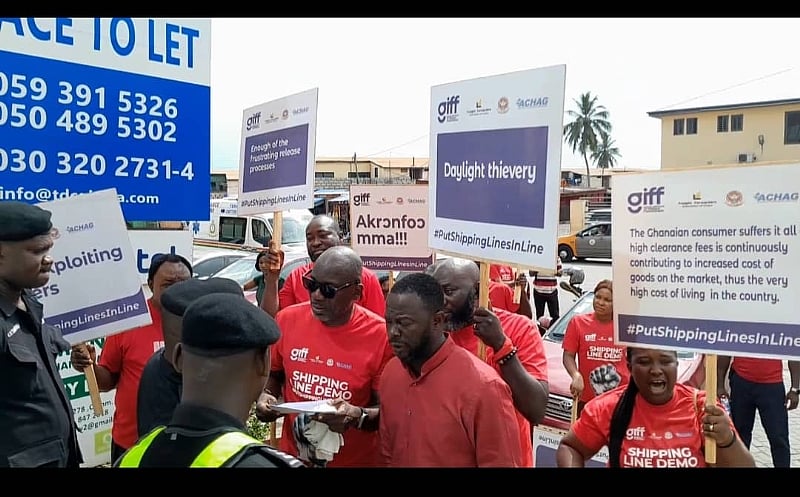Tensions between the Ghana Institute of Freight Forwarders (GIFF) and Hapag Lloyd Ghana Limited escalated recently when Robert Oram, the Country Manager of Hapag Lloyd, allegedly refused to accept a petition from the freight forwarders in the presence of the media. This incident unfolded during a picket held at several shipping lines in Tema, where the freight forwarders protested what they described as exploitative port charges. This protest was a continuation of their previous demonstration on September 24, 2024, aimed at voicing their dissatisfaction over port fees and seeking better financial terms from shipping companies operating in the region.
Following a period of discontent and a 14-day ultimatum issued to shipping lines, the freight forwarders decided to escalate their actions by staging a picket at various companies, including Arkas Ghana Limited and Hapag Lloyd Ghana Limited. Their insistence on meeting directly with Oram, instead of sending a representative, highlighted their frustration and eagerness to engage at a higher level regarding their grievances. While attempting to submit their petition, the freight forwarders were met with resistance when Robert Oram eventually agreed to meet them but chose not to proceed with discussions when media representatives were present, leading to heightened pressure on both sides.
Stephen Adjokatcher, the President of GIFF, expressed the organization’s unwavering commitment to advocating for better business conditions at the ports. He reiterated that these protests are not merely actions of discontent but well-organized efforts to bring attention to significant issues that affect their work and the wider industry. Adjokatcher emphasized the importance of addressing the concerns regarding shipping fees and port charges as these directly impact the livelihood of many freight forwarders and the broader trading environment in Ghana.
Beyond the immediate conflicts with Hapag Lloyd, GIFF announced their intentions to monitor the operations of the Ghana Shippers Authority more closely following the enactment of new laws concerning shipping and freight forwarding. This indicates a broader strategy by GIFF to keep a check on regulatory changes that could further affect their operations and the costs associated with shipping. The freight forwarders hope that by remaining vigilant, they can ensure that any new regulations foster a fairer and more equitable environment for all stakeholders involved.
The tensions and protests reflect the growing frustrations within the freight forwarding community, stemming from perceived exploitation by shipping lines and administrative bodies. As costs continue to rise, freight forwarders feel the burden of these charges directly, which ultimately influences their ability to operate competitively. The movement initiated by GIFF signals a determined approach to challenge these practices and seek reforms that can alleviate some of the financial pressures they face.
In conclusion, this unfolding situation between GIFF and Hapag Lloyd exemplifies a larger narrative within the freight forwarding and shipping industries, where stakeholders are increasingly vocal about the conditions that govern their operations. As they navigate the complexities of tariffs, fees, and regulations, the call for dialogue and reform continues to grow louder, showing a collective resolve among the freight forwarders to secure a sustainable future for their industry in Ghana.














